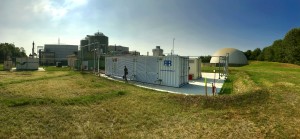ProGeo is a project funded by the European Union under the Horizon 2020 program, launched in 2016 and closed this year, which stems from two needs: storing energy surplus (from renewable energy sources and not) and decreasing carbon dioxide, a main responsible of global warming.
The ProGeo partners have awarded HYSYTECH the design and construction of the process plant (catalytic methanation plant and purification system) sited in the Acea Pinerolese Industriale Polo Ecologico.
The beginning: the Prometeo (Prometheus) project
The ProGeo’s starting idea is based on Prometheus project, a previous project which aimed to the use of electricity from renewable sources in order to produce hydrogen (H2) through water electrolysis. This hydrogen (H2) could then be used to produce methane (CH4) by reacting with carbon dioxide (CO2) in a chemical reactor.In the idea of the previous Prometeo project, the transformation and storage of the energy would have allowed the decoupling of energy generation from its consumption.
From Prometeo to ProGeo
By aligning the original idea with the needs of the energy market, ProGeo’s project focus moved towards the objective of reducing CO2 emissions, a well-known by-product of several industrial processes, approaching the concept of a closed-loop cycle. In ProGeo, waste carbon dioxide is a resource: in the case of industrial CO2, it converts associated costs (carbon tax) into revenues; in the case of biological CO2 (fermentation), it creates value from a stream that would have been otherwise released into the atmosphere.
ProGeo is based on consolidated high-efficiency technologies. Its innovative quality consists in an intelligent integration and use. The implementation of the Sabatier reaction allows to treat CO2 like a processing reagent, reducing emissions and the carbon tax; technologies for the storage and use of methane are well-known and allow for a high flexibility in use.
ProGeo at the Acea Pinerolese Polo Ecologico
The plant of ProGeo has been installed within a waste facility with the anaerobic digestion of sorted organic waste at the Polo Ecologico of Acea Pinerolese Industriale.
Here, hydrogen is used to produce methane (CH4) from carbon dioxide (CO2) recovered from the biomethane generation process. The CO2 contained in the biogas is recovered from the waste gas in biomethane production and, through the methanation plant, used to further produce biomethane.
Plants constructed by HYSYTECH
HYSYTECH was awarded by the partners of the ProGeo project to design and build the project plant engineering.
HYSYTECH Srl is an engineering company founded in 2003, specialized in the design, development and industrial implementation of new turn-key process technologies and equipment, leader in Europe in the field of generation, treatment and recovery of industrial gases, organic liquids and energy. HYSYTECH designs and builds biomethane production plants starting from raw biogas and integrated Bio-LNG conditioning and liquefaction plant starting from biomethane.
The first plant in Italy producing pipeline biomethane from municipal organic waste was built in 2014 by HYSYTECH, which in 2020 will build a new plant – again at the Polo Ecologico, able to handle up to 1,500 Sm3/h of biogas – which will inject biomethane into the natural gas distribution network with intended use in transportation.
As a partner of the European STORE & GO project, HYSYTECH has built Bio-LNG purification and micro-liquefaction system for the CO2 methanation plant in Troia (FG).
For the ProGeo project, HYSYTECH has developed an innovative process of single stage inter-cooled catalytic methanation with recirculation, designing and realizing the catalytic methanation plant and the purification system.
The integration of the purification section allows to reach the same quality specifications of the biomethane and, at the same time, to implement a recirculation of reagents that allows to improve the performance of the entire cycle, when compared with traditional two-stage methanation plants.
This process innovation allows to reduce the necessary equipment (decreasing the investment) and guarantees the achievement of a clearly lower unreacted H2 content (increasing the recovery and valorization of the hydrogen and the electricity used to produce it).
Text by Enrico Di Nola, HYSYTECH Srl



